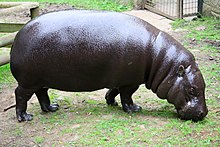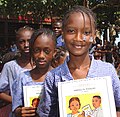Portal:Guinea
The Guinea Portal
Guinea (/ˈɡɪni/ GHIN-ee), officially the Republic of Guinea (French: République de Guinée), is a coastal country in West Africa. It borders the Atlantic Ocean to the west, Guinea-Bissau to the northwest, Senegal to the north, Mali to the northeast, Côte d'Ivoire to the southeast, and Sierra Leone and Liberia to the south. It is sometimes referred to as Guinea-Conakry after its capital Conakry, to distinguish it from other territories in the eponymous region such as Guinea-Bissau and Equatorial Guinea. Guinea has a population of 14 million and an area of 245,857 square kilometres (94,926 sq mi). Formerly French Guinea, it achieved independence in 1958. Guinea has a history of military coups d'état. After decades of authoritarian rule, in 2010 it held its first democratic election. As it continued to hold multi-party elections, the country continued to face ethnic conflicts, corruption, and abuses by military and police. In 2011, the United States government claimed that torture by security forces and abuse of women and children (including female genital mutilation) were ongoing human rights issues. In 2021, a military faction overthrew president Alpha Condé and suspended the constitution. Muslims represent 90% of the population. The country is divided into four geographic regions: Maritime Guinea on the Atlantic coast, the Fouta Djallon or Middle Guinea highlands, the Upper Guinea savanna region in the northeast, and the Guinée forestière region of tropical forests. French, the official language of Guinea, is a language of communication in schools, in government administration, and the media. More than 24 indigenous languages are spoken and the largest are Susu, Pular, and Maninka, which dominate respectively in Maritime Guinea, Fouta Djallon, and Upper Guinea, while Guinée forestière is ethnolinguistically diverse. Guinea's economy is mostly dependent on agriculture and mineral production. It is the world's second largest producer of bauxite, and has deposits of diamonds and gold. The country was at the core of the Western African Ebola virus epidemic. Selected article -The pygmy hippopotamus or pygmy hippo (Choeropsis liberiensis) is a small hippopotamid which is native to the forests and swamps of West Africa, primarily in Liberia, with small populations in Sierra Leone, Guinea, and Ivory Coast. It has been extirpated from Nigeria. The pygmy hippo is reclusive and nocturnal. It is one of only two extant species in the family Hippopotamidae, the other being its much larger relative, the common hippopotamus (Hippopotamus amphibius) or Nile hippopotamus. The pygmy hippopotamus displays many terrestrial adaptations, but like the common hippo, it is semiaquatic and relies on water to keep its skin moist and its body temperature cool. Behaviors such as mating and giving birth may occur in water or on land. The pygmy hippo is herbivorous, feeding on ferns, broad-leaved plants, grasses, and fruits it finds in the forests. (Full article...)Did you know -
More Did you know (auto generated)
TopicsGeneral images -The following are images from various Guinea-related articles on Wikipedia.
MapRelated portalsWikiProjectsCategoriesAssociated WikimediaThe following Wikimedia Foundation sister projects provide more on this subject:
Discover Wikipedia using portals | ||||













































